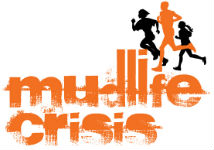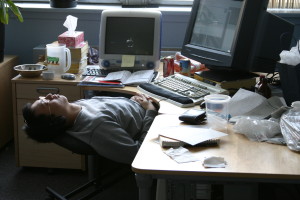Many of you know that I’m a web developer and data analyst in my day job. It’s a career that I mostly enjoy, and I like that it offers me the opportunity to learn a lot, exercise my mind quite a bit, and keep abreast of the tech world – a bonus for any budding entrepreneurial type in this day and age, without a doubt.
But that can come with a downside at times. The tech world can be a VERY unhealthy place. There are lots of late nights, stress (both self-imposed and otherwise), nights of being the on-call person, and the general “geek” environment of unhealthy snacks and such. I’ve tried very hard to do away with as much of those factors via my choice of position (I am currently in a less-stressful workplace than many I’ve been in during my career), location of my job (my daily commute is 20 minutes or so if I take a bus and less than 10 if I ride in a Car2Go), and modifications I’ve made to my work environment (using a standing desk, for example).
But that’s not a consistent thing. Last week, for example, I was attending software training at an off-site location. If you’re not in the tech field, here’s the situation: there are lots of companies that make their money by offering software training for everything from the basics of Windows up to highly technical classes on networking, programming, and more. Sometimes they have their own trainers and other times they rent out space and equipment to other companies’ trainers.
I was in class from Monday through Thursday for eight hours a day on a new (to me) data visualization platform. And it was interesting stuff, don’t get me wrong. But eight hours of that a day for four days was a bit much even for me. Here’s some of the stuff I realized:
1. Going from eight hours of standing and moving around at will to eight hours in a chair is exhausting.
I’m pretty used to being able to stroll around, squat, do stretches, and more during the day. It keeps me moving regularly, lets me think away from the cube, and helps me focus on what I’m doing more than sitting in a desk ever will. So suddenly being forced to sit all day and watch a fellow teach you is exhausting.
We usually think of exercise, movement, etc. as the thing that exhausts us, while sitting down is restful. I’m here to tell you that nothing could be further from the truth. What’s tiring is letting the blood pool in your butt all day and to limit your movement to your mouse and keyboard activities. Getting blood moving through your body regularly and moving nutrients and oxygen around in your body is what keeps you alert. And frequent low-level movement throughout the day is the most natural way to do that. Sometimes we have to find ways to do it – particularly if you work a desk job or are stuck in one place all day. But I think it’s worth working toward – and if you create enough value in your work, your employer should help you find a way to get that.
If they don’t, then, to me, it’s time to find a new employer ASAP.
2. The human brain can only stand so much input at a time.
Even if you are a smart person and really completely enjoy a topic, there’s only so much you can take before your brain wants to shut down. I think that’s a big part of what “falling asleep in class” is about when you’re in school. Yeah, there’s the need for more sleep in general, but keeping an active, open mind is also really tough. If you’ve ever tried to meditate (and I highly recommend it if you don’t), you know that it can be very difficult to do because the human brain is constantly trying to fill a thinking void with thoughts. Pushing those out so you can listen is hard work.
Experts in sleep also talk about how one of the reasons for sleep is the downtime needed to process information. As we sleep at night, our brains do the heavy lifting of pushing the data we’ve collected around to where it’s best kept in our brain, synthesizing it with what we already know. That’s part of the reason that the idea of “I’ll sleep on it” so frequently leads to such good results: starting the night with a question and then letting your mind process the topic while you sleep allows your brain to collect that data and get it ready for putting into action.
But I think that people also need time to process after a certain amount of data is taken in. There’s a lot of talk about things like the positive habit of a siesta, or polyphasic sleep, or other napping/shorter sleep cycles in productivity and health circles, and to me that makes sense. You take in information, and then after you get to a certain point, you take a nap or even go longer. So sitting in an eight-hour class is really something of an unnatural act not only from the movement standpoint but also from a brain activity standpoint.
3. Commuting can really suck the life out of you.
The training center I was at was no where near my job. I work in downtown Columbus, and the center was up north in one of our suburbs (where there’s a lot of high-end information technology-based industry, to be fair). And as my wife and I only own one car, I had to take the bus up there. So my 15-20 minute commute on most days turned into an hour and a half. I was leaving the house at 6:30 and getting to training at 8:00. More sitting, obviously, and even though I wasn’t driving myself it was still exhausting. I had plenty to do on the ride – a month of podcasts to catch up, for example, and of course there’s always plenty of work I can do with just my phone in this day and age. So my mind was engaged and I wasn’t stressed out by having to deal with bad drivers all around me.
But it confirmed for me that I have made the right choice in where my home is. I live in a very walkable neighborhood. I have pretty much everything I need in walking or biking distance with the exception of my job, and even then the bus stop is a five- to six-minute walk away.
I marvel at the people who don’t take the stress of their commute into consideration when they choose a home. When I was a consultant instead of a full-time employee and was driving around to different sections of the city for my positions, my health was much worse. I’d be on the road a couple hours a day (which, to many, is not bad) and that whole time was stressful as I dealt with traffic and weather and more. But, I didn’t know anything else because I hadn’t experienced it… till my car broke down at one point. I was forced to take the bus for a few days while it was being repaired, and the light went on as my stress level plummeted. I got into riding the bus, and later into biking to work (you can see my old bike commuting blog at Carless Columbus if you’re interested).
And that led to purposefully locating a house where I didn’t have to have a car. Life’s been much better since then.
4. Proper planning can keep you from going off the wagon, food-wise.
One of the common “perks” of a training center like the one I was at is that they frequently offer free snacks and drinks to attendees. Sounds awesome, but if you’re into a healthy lifestyle like I am it was not helpful. Free pop, cookies, and granola bars and the like started to add up after a while. The first couple of days, I made sure to get out of the classroom and down to a grocery with a good organic section to grab healthy snacks so that I wouldn’t be tempted while I was there. I also brought some lemon and peppermint essential oils to flavor my water (the water, though bottled, was also free) so that I could curb cravings that way.
As I got more tired throughout the week, though, my willpower began to flag and I partook of some of the stuff that I shouldn’t have. I was also less motivated to put together some healthier sweet-tooth items at home to get ready. The next time I have to take a class, I’ll know that I need to make some healthy stuff the weekend before and have those things ready and partitioned out to last through the entire week. That’d be cheaper and healthier.
So there was definitely some stuff that I could have done to improve the situation and some stuff (like the lack of movement freedom and standing desks) that was out of my control. I’ll be more prepared next time this happens – no matter whether it’s software training, personal development conference, or whatever.
What lessons have you learned about optimizing your workplace for better health? Share in the comments!







